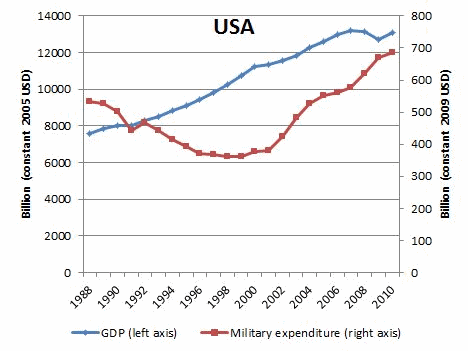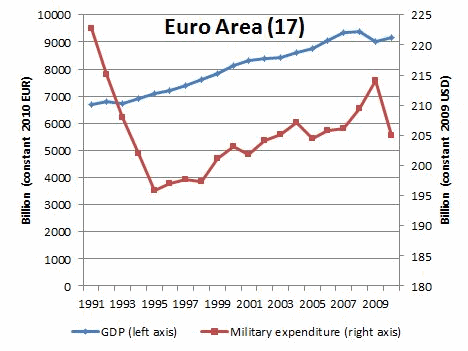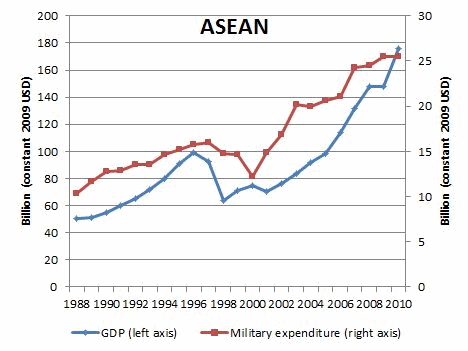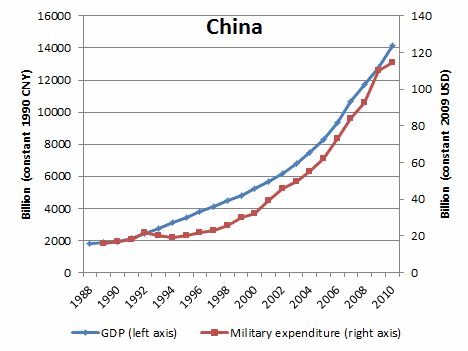Defense Spending: Economy Trumps Strategy
15 Feb 2012
In Monday's discussion entitled Power and Plenty, we tried to identify those metrics that best reflect a nation's actual or potential military power. Today, we'd like to complement and elaborate on this theme by reminding ourselves that 1) current defense spending, much like in the past, is often shaped by economic considerations rather than strategic calculations, and 2) today's financial crisis is encouraging, if not outright forcing, global shifts in the deployment of military power.
An immediate example of both these truths is the United States. Indeed, while many policymakers were gathering for the external pageMunich Security Conferencecall_made, Barack Obama and his Secretary of State for Defense Leon Panetta outlined plans to reduce American defense expenditures by $450 billion over the next ten years. These cuts, which are basically being driven by the U.S. government's budgetary woes, will not only include a substantial reduction in the U.S.'s military footprint in Europe, it will also feature a shift in America's strategic focus to the Far East and Pacific.
We have, of course, seen this pattern before. Subsequent to the collapse of the Soviet Union, the United States did significantly reduce its defense expenditures. Although analysts at the time characterized these cuts as being driven by a 'peace dividend', it's important to remember that they were also precipitated by an economic recession. According to Barno et al, what distinguishes the current round of defense cuts from those of the 1990s is that the risks involved in today's cuts, in terms of coping with international threats, are higher than then - i.e., the United States has to contend with the feared rise of a militarized and hegemonic China (at least at the regional level), with Iran's continued intransigence over its nuclear ambitions, and with the migration of transnational terrorism into sub-Saharan Africa and elsewhere. While some believe that Washington's shift in strategic focus to the Asia-Pacific region at least reflects a partial and premeditated attempt to lower its security risks, others see budget deficits dictating U.S. strategy more than anything else.
A similar pattern to America's behavior can also be observed in Europe. According to a recent study by the European Parliament , military spending within most European Union (EU) member-states decreased considerably in the aftermath of the financial crisis. (There are exceptions to this trend, such as France, which has tried to use military spending to stimulate its economy.) Indeed, according to the Stiftung Wissenschaft und Politik's (SWP) Christian Mölling the crisis has not only aggravated the 'usual' underfinancing of European defense establishments, it has also affected the strategic calculations of many European states. In other words, "budget constraints are now changing the aims and means of defense policy abruptly." European states are being forced to re-evaluate how they intend to preserve their sovereignty, military effectiveness and economic efficiency all at the same time. And if we are to believe the European Parliament study, the region's period of austerity will continue for another twenty years, which means defense expenditures will remain inappropriately low for the foreseeable future.
Finally, if we look to Asia we see a different trend. Yes, the Asian Financial Crisis of 1997 prompted a dramatic reduction in the defense budgets of Southeast Asian countries. Sheldon W Simon, for example, points out that "the members of the Association of Southeast Asian Nations (ASEAN) spent one-third less on defense in 1998 than in 1997." Yet in stark contrast to the United States and its NATO allies, defense expenditure in Southeast Asia gathered momentum after the 1997 crisis and soon returned to pre-crisis levels. China, it should be noted, was in an even more advantageous position. Since it was not truly affected by the economic troubles of 1997, it has been consistently increasing its external pagedefense budgetscall_made since 1989, in parallel with its economic growth and increasing geopolitical leverage.
Accordingly, the two most recent economic crises demonstrate that all defense budgets remain malleable. In the United States and Europe, for example, neoliberal policies have tied the fate of defense spending to scarce government resources. Asia- Pacific states, on the other hand, have largely rejected the 'austerity solution' and quickly returned to increased defense spending. This, argues Klaus Olshausen, has resulted in a rising military "high tide" in East Asia and a "low tide" in Europe and the US. Both tidal movements are critical, however: the uncoordinated decrease in defense capabilities in Europe may have as destabilizing an effect on international security as a real or misperceived military build-up in Asia. (The United States' strategic relocation to the Asia Pacific region, in turn, suggests that it has a clearer idea about which tide is the more dangerous.) Whether European governments make the best of their low tide by cooperating more intensely on defense still remains to be seen, but the signs are not good.
What the above trends mean for the long-term is subject to interpretation, of course. The political science literature does teach us one important lesson, though - if you want true stability in an international system, then military hegemony is good. You can argue about the nature and rightness of the hegemony, but the beneficial blanketing or smothering effect it has on systemic violence is a historical fact. Absent this type of hegemony, which the U.S. and its allies are now abandoning, the international system will feature higher degrees of risk in the coming years. And that, one can argue, is the most worrying legacy of the slash and burn approach to budget-cutting that we are now seeing in Western defense economics today.





